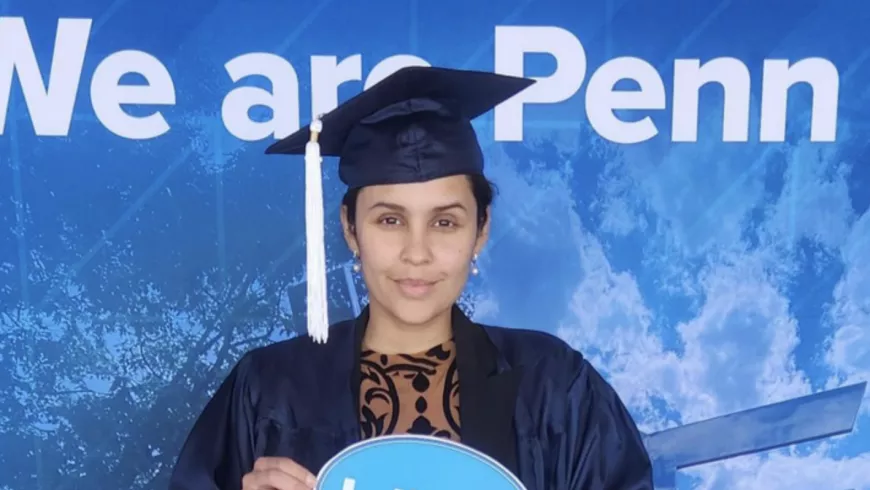Application deadline
Credits and costs
Lead the Shift toward Renewable Energy and Sustainability
Policy changes, technological advances, and an increased awareness of the world's resources are creating a growing need for advanced expertise in renewable and sustainability systems. Now more than ever, it's critical to prepare yourself to serve as a leader of the green economy. The Master of Professional Studies in Renewable Energy and Sustainability Systems (MPS-RESS) degree can help you succeed in this dynamic field.
This 33-credit online program provides you with technical depth in areas related to renewable energy. You can also gain a comprehensive understanding of energy economics, applications of technology in society, and the project development process.
To make the most of your graduate program, the RESS program offers tracks in Renewable Energy Systems or Sustainability Management and Policy to let you customize your degree for your future.
Why an Online Degree from Penn State?
The Master of Professional Studies in Renewable Energy and Sustainability Systems degree is delivered through a partnership with Penn State’s College of Earth and Mineral Sciences and Penn State World Campus, a pioneer in providing global online access to a real university education. Your online courses are the same academically challenging courses that are taught on campus. Yet they give you the flexibility and convenience to study wherever you are, at times that suit your own schedule.
The courses in the graduate programs are designed and taught by Penn State professors whose teaching and research interests combine academic expertise and industry experience. They are leaders in their fields and experts in the subjects that they teach, and they are committed to making sure you receive a quality academic experience in your online programs.
Renewable Energy and Sustainability Systems Curriculum
As a student in the MPS-RESS program, you will take a number of courses in varying subject matter to help you meet the demands of the dynamic renewable energy and sustainability marketplace. After completing your 12-credits in core courses, you will be able to tailor your studies to 12-credits in either our Sustainability Management and Policy or Renewable Energy Systems track. Then, to meet your individual learning goals, you will select 6 additional credits from a broad list of electives. Finally, you will complete a 3-credit capstone experience in Management and Design of Renewable Energy and Sustainability Systems or partake in a special topics research opportunity with a faculty member.
Learning Outcomes
Our renewable energy and sustainability systems graduate programs are designed to allow working professionals to apply their learning immediately to their field. While competencies in certain areas depend upon what track you decide upon, in general, upon completion of your program, you should be able to:
- execute and evaluate sustainability or renewable energy systems using baseline, techno-economic, life cycle, or cost/benefit analyses.
- demonstrate fundamental understanding of the principles of energy science, including resource availability and conversion technologies.
- demonstrate an appreciation for the commercialization process relative to project and product development.
- demonstrate the ability to make sound decisions in complex situations.
- evaluate sustainability decisions in the broader context of society's interests.
Courses
The overall objective of the 33-credit online MPS-RESS program is to help you gain the knowledge to become a technically outstanding expert in renewable energy and sustainability systems, with strong project development and leadership skills. In addition, the program can prepare you to apply engineering principles to the business of energy in a variety of commercial and industrial occupations.
Areas specifically related to the following will be included:
- System thinking and analysis
- Sustainability assessment
- Energy system performance analysis
- Project development
- Business acumen
- Policy analysis
- Advanced critical thinking
You will take 12 credits in the program's core courses, 12 credits in your chosen track, and 6 credits of electives in consultation with your program adviser. You will then complete your studies with a 3 credit capstone experience.
The Master of Professional Studies (MPS) degree in RESS will be conferred upon students who complete a minimum of 33 credits while maintaining a grade-point average of 3.0 or better in all course work, including at least 18 credits at, or above, the 500 level (with at least 6 credits at the 500 level), and who complete the capstone experience requirement.
Core Courses (12 credits)
Track Courses (12 credits)
Select 12 credits in either the Sustainability Management and Policy or Renewable Energy Systems track.
Sustainability Management and Policy Track (12 credits)
Renewable Energy Systems Track (select 12 credits)
Elective Courses (select 6 credits)
Students may select two electives that focus on complementary disciplines such as Systems Engineering, Ecosystem Management, Community and Economic Development, Meteorology, and more. View the the most current list of elective courses, and contact the program office at [email protected] with any questions.
Capstone Experience (3 credits)
- or:
Course Availability
If you're ready to see when your courses will be offered, visit our public LionPATH course search (opens in new window) to start planning ahead.
Costs and Financial Aid
Graduate Tuition
Graduate tuition is calculated based on the number of credits for which you register. Tuition is due shortly after each semester begins and rates are assessed every semester of enrollment.
| How many credits do you plan to take per semester? | Cost |
|---|---|
| 11 or fewer | $1,017 per credit |
| 12 or more | $12,203 per semester |
| How many credits do you plan to take per semester? | Cost |
|---|---|
| 11 or fewer | $1,027 per credit |
| 12 or more | $12,325 per semester |
Financial Aid and Military Benefits
Some students may qualify for financial aid. Take the time to research financial aid, scholarships, and payment options as you prepare to apply. Military service members, veterans, and their spouses or dependents should explore these potential military education benefits and financial aid opportunities, as well.
To view the detailed list of cost of attendance elements, select “World Campus” as the location on the tuition site.
How to Apply
Deadlines and Important Dates
Your degree application, including receipt of all transcripts, should be received by the following deadlines to be considered complete.
This program accepts applications throughout the year. If you wish to begin taking courses in a particular semester, please submit a completed application by the semester application deadlines noted below.
The application deadlines for this program are:
Admissions Help
Your degree application, including receipt of all transcripts, should be received by the following deadlines to be considered complete.
Admission Requirements
For admission to the Graduate School, an applicant must hold either (1) a baccalaureate degree from a regionally accredited U.S. institution or (2) a tertiary (postsecondary) degree that is deemed comparable to a four-year bachelor's degree from a regionally accredited U.S. institution. This degree must be from an officially recognized degree-granting institution in the country in which it operates
Penn State's online MPS-RESS program is suitable for individuals of diverse backgrounds and requires no prerequisite course work. However, for your admission to the program, it is preferred that you have a technical mindset and are interested in focusing on the implementation and interpretation of existing policies and regulations as they relate to renewable energy and sustainability.
What You Need
Applications are submitted electronically and include a nonrefundable application fee. You will need to upload the following items as part of your application:
Official transcripts from each institution attended, regardless of the number of credits or semesters completed. Transcripts not in English must be accompanied by a certified translation. Penn State alumni do not need to request transcripts for credits earned at Penn State, but must list Penn State as part of your academic history. If you are admitted, you will be asked to send an additional official transcript. You will receive instructions at that time.
English Proficiency — The language of instruction at Penn State is English. With some exceptions, international applicants must take and submit scores for the Test of English as a Foreign Language (TOEFL) or International English Language Testing System (IELTS). Minimum test scores and exceptions are found in the English Proficiency section on the Graduate School's "Requirements for Graduate Admission" page. Visit the TOEFL website for testing information. Penn State's institutional code is 2660.
GRE and GMAT test scores are NOT required.
References (3) — You will need to initiate the process through the online application by entering names, email addresses, and mailing addresses of references. Upon submission of your application, an email will be sent to each recommender requesting they complete a brief online recommendation regarding your commitment for success in an online program. Please inform all recommenders they must submit the form in order for your application to be complete.
Program-Specific Questions/Materials
Vita or Résumé — Upload your résumé to the online application.
Statement of Purpose — You should submit a personal statement not to exceed two single-spaced pages, which should describe your specific career goals and objectives, prior experience relevant to the decision to pursue an advanced degree, and other information that may be useful to the admissions committee.
Start Your Application
You can begin your online application at any time. Your progress within the online application system will be saved as you go, allowing you to return at any point as you gather additional information and required materials.
Begin the graduate school application
- Choose Enrollment Type: "Degree Admission"
- Choose "WORLD CAMPUS" as the campus
Checking Your Status
You can check the status of your application by using the same login information established for the online application form.
Technical Requirements
Review the technical requirements for this degree program.
Ready to Learn More?
Get the resources you need to make informed decisions about your education. Request information on this program and other programs of interest by completing this form.
Contact Us
Our Student Services and program specialists are available now to help you with your application and to answer any questions you have about our graduate programs in Renewable Energy and Sustainability Systems (RESS). Please contact us with anything you wish to discuss.
Noelle Capparelle, MPS-RESS Program Assistant
Email: [email protected]
Phone: 814-867-5401
To see more detailed information about the renewable energy and sustainability systems portfolio, visit the RESS program website. You can also visit the Open Educational Resources website to preview some of the courses offered online by the Department of Energy and Mineral Engineering.
For general questions about Penn State World Campus, please contact:
World Campus Admissions Counselors
Phone: 814-863-5386
Email: [email protected]
Faculty
Seth Blumsack
- DegreePh.D., Engineering and Public Policy, Carnegie Mellon University
- DegreeM.S., Economics, Carnegie Mellon University
- DegreeB.A., Math and Economics, Reed College
Dr. Seth Blumsack's research focuses on policy-driven issues and technological change faced by the electricity and natural gas industries. He studies regulation, network reliability and resilience, and technological change in the power grid and natural gas supply systems.
Mohamed Amer Chaaban
- DegreePh.D. Candidate, Electrical Engineering, University of North Carolina-Charlotte
- DegreeM.S., Architectural Engineering, University of Nebraska-Lincoln
- DegreeB.S., Electrical Engineering, Damascus University
Mohamed Amer Chaaban is an adjunct instructor for the RESS graduate online program at Penn State. He is the author and instructor of AE 868. He worked for AEP and RGS Energy, one of the nation's top solar power companies, as a solar design engineer. During his work, he designed thousands of residential and dozens of large commercial solar systems combined with more than 20 megawatts in capacity. He is an advocate of sustainability and of making solar affordable for all humans in the world.
Mark Fedkin
- DegreePh.D., Geo-Environmental Engineering, Penn State
- DegreeM.S., Geo-Environmental Engineering, Penn State
- DegreeB.S., Geology, Moscow State University (Russia)
Dr. Mark Fedkin is an assistant teaching professor and lead faculty of the energy and sustainability policy program at Penn State. He is also a lead faculty in the renewable energy and sustainability systems graduate online program. He has worked for more than ten years for the Earth and Mineral Sciences Energy Institute, where he led experimental research on electrochemical energy systems and processes, including fuel cells, hydrogen technologies, electrophoresis, and corrosion in extreme environments. During his career as an experimentalist, Dr. Fedkin developed a number of methods and technologies for monitoring and sensing the environmental parameters in both simulated and natural settings.
Derek M. Hall
- DegreePh.D., Energy and Mineral Engineering, Penn State
- DegreeB.S., Energy Engineering, Penn State
Dr. Derek M. Hall's research focuses on electrochemical energy conversion and aqueous electrochemistry. He studies electrochemical reactions in aqueous environments using electrochemical techniques, materials characterization methods, and computational modeling.
Andy James
DegreeB.S., Marketing, Penn StateAndy James is course author and instructor of Sustainability-Driven Innovation. In addition to his role at Penn State, he is vice president, corporate strategy at New Pig. He has more than 10 patents pending for his work in understanding and resolving environmental risks from industrial spills. Prior experience includes his time as senior manager at Olson Zaltman, where he provided consumer behavior research and brand strategy consulting to brands including Audi, T. Rowe Price, and MillerCoors.
Mark D. Kleinginna
- DegreeMPS, Renewable Energy Systems and Sustainability, Penn State
- DegreeM.A., Economics, Penn State
- DegreeB.S., Economics, Penn State
Mark D. Kleinginna is interested in the entire continental energy topology, including research and expert testimony in rate making, electricity transmission, renewable energy systems, decarbonization of the built environment, and thermal energy networks.
Brandi Robinson
- DegreeM.S., Geography, Penn State
- DegreeB.A., Environmental Studies and Geography, University of Pittsburgh
Brandi Robinson is an associate teaching professor and director of advising for the Penn State Energy and Sustainability Policy program. She also serves as an instructor for the renewable energy and sustainability systems master's program. She brings expertise in policy formation and analysis relative to carbon markets to her teaching, as well as local-scale greenhouse gas inventorying and mitigation strategy development.
Eugene Morgan
- DegreePh.D., Civil and Environmental Engineering, Tufts University
- DegreeM.S., Civil and Environmental Engineering, Tufts University
- DegreeB.S., Earth Sciences, UC Santa Cruz
Eugene Morgan is an associate teaching professor in the Department of Energy and Mineral Engineering at Penn State. He also serves as the associate head of Undergraduate Education, as well as the program chair for the energy engineering major. His research interests include risk management for geologic carbon storage (CO2 sequestration) with particular focus on geophysical monitoring systems.
Erich Schienke
- DegreePh.D., Science and Technology Studies, Rensselaer Polytechnic Institute
- DegreeM.S., Science and Technology Studies, Rensselaer Polytechnic Institute
- DegreeB.A., Technology Studies, Hampshire College
Dr. Erich Schienke's research and teaching interests are in the areas of energy policy, renewable energy systems design and implementation, ethical dimensions of renewable energy and sustainability systems, sustainability indicators, ESG, and workforce requirements needed to meet the demands of the rapidly growing renewable energy industry. He has published in multiple peer-reviewed journals and edited volumes, which have received more than 250 citations across a range of topics, including climate risk management, ethics and sustainability, and ecological governance.
Susan W. Stewart
- DegreePh.D., Mechanical Engineering, Georgia Institute of Technology
- DegreeM.S., Mechanical Engineering, Georgia Institute of Technology
- DegreeB.S., Mechanical Engineering, Penn State
Dr. Susan W. Stewart is an associate teaching professor of aerospace engineering and leads the Graduate Certificate in Wind Energy program. She has developed and taught multiple online renewable energy courses as well as led several winning teams of students in the annual Collegiate Wind Competition. Dr. Stewart also directs an outreach program involving wind energy applications for K–12 students. Her teaching and research encompass renewable energy technology, resource assessment, project development, design standards, and project finance.





